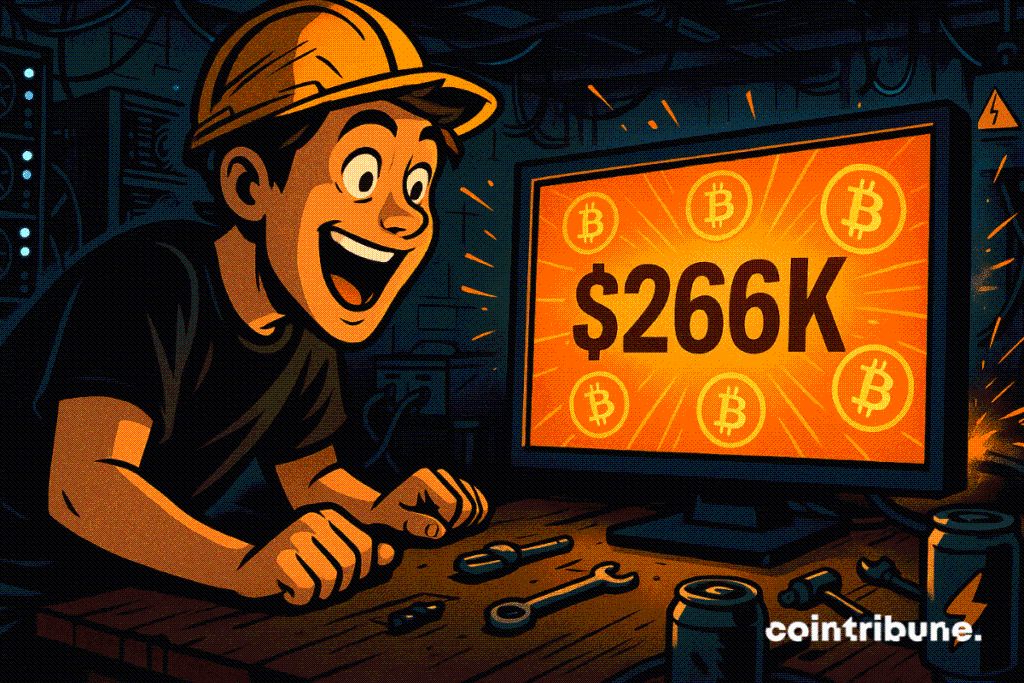Solo Bitcoin Miner Nets $266K in Rare Bitcoin Block Victory
A rare win captured attention in Bitcoin mining on Friday space when a solo miner managed to solve block 924,569 using only a small fraction of the computing power usually required. In a space dominated by massive operations, this achievement stands out as an interesting feat.

In Brief
- A solo miner earned 3.146 BTC, worth around $266,000, by successfully mining a Bitcoin block, a rare achievement for an individual miner.
- The payout included 3.125 BTC from the block reward and 0.021 BTC from transaction fees collected in the block.
Solo Miner Defies the Odds
Blockchain data provider Mempool Space reports that the miner received a total of 3.146 BTC, valued at around $266,000. The payout comprised 3.125 BTC from the block subsidy and 0.021 BTC in transaction fees.
What makes this win particularly interesting is the individual’s equipment. Solosatoshi reported that the setup is a hobby-level Bitaxe Gamma, running at around 1.2 terahashes per second. While that is a large number in isolation, it is minuscule compared to large-scale mining operations that work in the exahash range, capable of performing a quintillion hashes per second.
CKpool creator Con Kolivas notes that, based on this hash rate, the odds of such a win are roughly one in 1.2 million on any given day, highlighting the rarity of the event.
Independent Miners Making Their Mark
Despite the dominance of large mining companies, solo miners have scored several significant wins this year. Data from blockchain tracker Mempool Space shows CKpool users have successfully mined 13 solo blocks in 2025 , averaging just over one per month.
- A miner with 2.3 petahashes of computing power claimed a full block reward in July, adding to similar solo wins earlier in the year ;
- Later in October, another solo operator secured block 920,440, taking home $347,455, which included the standard 3.125 BTC reward plus transaction fees.
These occasional successes highlight that individual operators continue to play an important role in the Bitcoin network. By contributing independent computing power, they strengthen decentralization and broaden participation, reducing the concentration of control by large mining operations and supporting a more balanced and secure blockchain system.
Large Mining Firms Diversifying
While small miners continue to achieve occasional wins, large companies are seeking ways to maintain profitability amid changing conditions. The recent halving of block rewards has reduced income from traditional mining, pushing firms to explore alternative revenue streams.
Riot, a major mining company, is evaluating the use of 600 megawatts of power at its Corsicana, Texas, facility for artificial intelligence and other high-performance computing applications.
Similarly, CleanSpark is shifting its operations toward AI-focused data centers. This transition has already been well received by investors, boosting CleanSpark’s stock by 13 % following the announcement last month. These initiatives illustrate a growing trend of mining companies leveraging their computing capacity for purposes beyond Bitcoin mining .
Disclaimer: The content of this article solely reflects the author's opinion and does not represent the platform in any capacity. This article is not intended to serve as a reference for making investment decisions.
You may also like
Zcash News Update: Zcash's 15-Fold Jump Ignites Debate Over Privacy and Market Power in Crypto
- Zcash (ZEC) surges 15x to $626 amid Bitcoin's 7-month low, sparking warnings from Bloomberg's Balchunas about privacy coins fragmenting crypto market support. - Winklevoss-backed Cypherpunk Technologies buys $18M ZEC, now holding 1.43% of supply as privacy-focused "censorship-resistant" asset gains institutional traction. - Bitcoin maximalists dismiss Zcash's rally as "Pump & Dump" schemes, while analysts debate whether privacy features undermine Bitcoin's institutional adoption narrative. - Market scrut

XRP News Today: XRP's Support Level Faces Pressure Amid Analyst Disagreements on Potential Decline
- XRP tests critical $1.90–$1.91 support zone amid intensified selling pressure, with whale dumping of 200M tokens exacerbating downward momentum. - Technical indicators show conflicting signals: Ichimoku Cloud bullish bias contrasts with RSI neutrality and bearish Fibonacci retracement risks. - Analysts split between potential 50% rebound if bulls reclaim $2.08–$2.26 levels or 55% slump to $1.00 amid deteriorating network activity and stalled user growth. - Market uncertainty amplified by Bitcoin weakness

TWT's Updated Tokenomics: Genuine Sustainability or Just Postponing Devaluation?
- Trust Wallet Token (TWT) rebranded as Toncoin in 2025, shifting from governance to gamified utility via the Trust Premium loyalty program. - A 2020 token burn eliminated 88.9B TWT (40% of supply), creating scarcity but raising liquidity concerns amid limited adoption incentives. - TNSR's market resilience contrasts with TWT's risks, as centralized utilities and opaque supply management threaten liquidity and institutional trust. - TWT's success depends on balancing gamified engagement with decentralized
The Rapid Rise of ZK (Zero-Knowledge) Assets and Protocols: How Network Enhancements and Institutional Embrace Impact Investments
- ZK protocols saw 2025 seismic growth via network upgrades and institutional adoption, reshaping investment theses for scalable, private blockchain infrastructure. - ZKsync's Atlas Upgrade achieved 43,000 TPS with $0.0001/tx costs, while Polygon and StarkNet secured $1B+ in adoption through EVM compatibility and 90% gas fee reductions. - Deutsche Bank , Walmart , and HSBC adopted ZKP for cross-chain settlements, supply chain transparency, and compliance, accelerating enterprise-grade use cases. - ZKP mark
